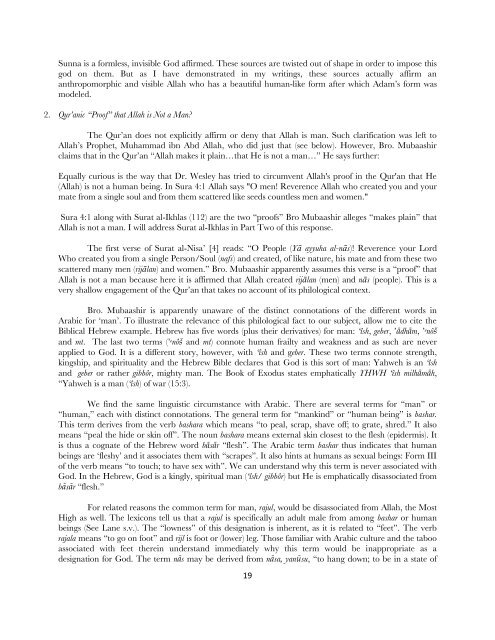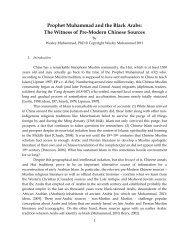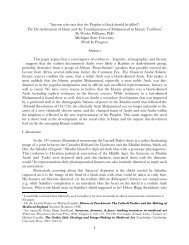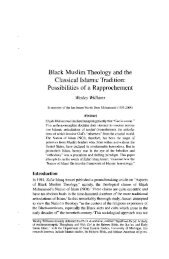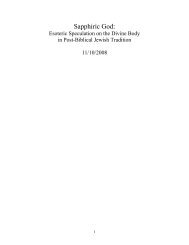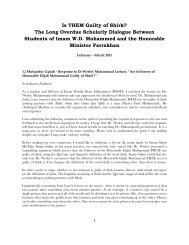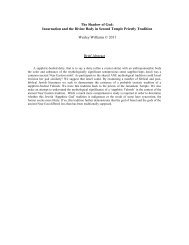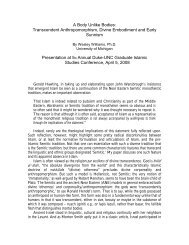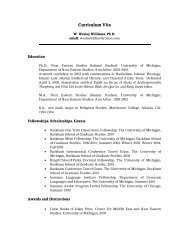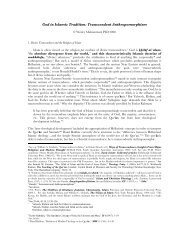Is THEM Guilty of Shirk? - Dr. Wesley Muhammad
Is THEM Guilty of Shirk? - Dr. Wesley Muhammad
Is THEM Guilty of Shirk? - Dr. Wesley Muhammad
Create successful ePaper yourself
Turn your PDF publications into a flip-book with our unique Google optimized e-Paper software.
Sunna is a formless, invisible God affirmed. These sources are twisted out <strong>of</strong> shape in order to impose this<br />
god on them. But as I have demonstrated in my writings, these sources actually affirm an<br />
anthropomorphic and visible Allah who has a beautiful human-like form after which Adam‘s form was<br />
modeled.<br />
2. Qur‟anic “Pro<strong>of</strong>” that Allah is Not a Man?<br />
The Qur‘an does not explicitly affirm or deny that Allah is man. Such clarification was left to<br />
Allah‘s Prophet, <strong>Muhammad</strong> ibn Abd Allah, who did just that (see below). However, Bro. Mubaashir<br />
claims that in the Qur‘an ―Allah makes it plain…that He is not a man…‖ He says further:<br />
Equally curious is the way that <strong>Dr</strong>. <strong>Wesley</strong> has tried to circumvent Allah's pro<strong>of</strong> in the Qur'an that He<br />
(Allah) is not a human being. In Sura 4:1 Allah says "O men! Reverence Allah who created you and your<br />
mate from a single soul and from them scattered like seeds countless men and women."<br />
Sura 4:1 along with Surat al-Ikhlas (112) are the two ―pro<strong>of</strong>s‖ Bro Mubaashir alleges ―makes plain‖ that<br />
Allah is not a man. I will address Surat al-Ikhlas in Part Two <strong>of</strong> this response.<br />
The first verse <strong>of</strong> Surat al-Nisa‘ [4] reads: ―O People (Yā ayyuha al-nās)! Reverence your Lord<br />
Who created you from a single Person/Soul (nafs) and created, <strong>of</strong> like nature, his mate and from these two<br />
scattered many men (rijālan) and women.‖ Bro. Mubaashir apparently assumes this verse is a ―pro<strong>of</strong>‖ that<br />
Allah is not a man because here it is affirmed that Allah created rijālan (men) and nās (people). This is a<br />
very shallow engagement <strong>of</strong> the Qur‘an that takes no account <strong>of</strong> its philological context.<br />
Bro. Mubaashir is apparently unaware <strong>of</strong> the distinct connotations <strong>of</strong> the different words in<br />
Arabic for ‗man‘. To illustrate the relevance <strong>of</strong> this philological fact to our subject, allow me to cite the<br />
Biblical Hebrew example. Hebrew has five words (plus their derivatives) for man: „îsh, geber, ‘ādhām, ‘ enôš<br />
and mt. The last two terms (‘ enôš and mt) connote human frailty and weakness and as such are never<br />
applied to God. It is a different story, however, with „îsh and geber. These two terms connote strength,<br />
kingship, and spirituality and the Hebrew Bible declares that God is this sort <strong>of</strong> man: Yahweh is an „îsh<br />
and geber or rather gibbôr, mighty man. The Book <strong>of</strong> Exodus states emphatically YHWH „îsh milhāmāh,<br />
―Yahweh is a man („îsh) <strong>of</strong> war (15:3).<br />
We find the same linguistic circumstance with Arabic. There are several terms for ―man‖ or<br />
―human,‖ each with distinct connotations. The general term for ―mankind‖ or ―human being‖ is bashar.<br />
This term derives from the verb bashara which means ―to peal, scrap, shave <strong>of</strong>f; to grate, shred.‖ It also<br />
means ―peal the hide or skin <strong>of</strong>f‖. The noun bashara means external skin closest to the flesh (epidermis). It<br />
is thus a cognate <strong>of</strong> the Hebrew word bāsār ―flesh‖. The Arabic term bashar thus indicates that human<br />
beings are ‗fleshy‘ and it associates them with ―scrapes‖. It also hints at humans as sexual beings: Form III<br />
<strong>of</strong> the verb means ―to touch; to have sex with‖. We can understand why this term is never associated with<br />
God. In the Hebrew, God is a kingly, spiritual man („îsh/ gibbôr) but He is emphatically disassociated from<br />
bāsār ―flesh.‖<br />
For related reasons the common term for man, rajul, would be disassociated from Allah, the Most<br />
High as well. The lexicons tell us that a rajul is specifically an adult male from among bashar or human<br />
beings (See Lane s.v.). The ―lowness‖ <strong>of</strong> this designation is inherent, as it is related to ―feet‖. The verb<br />
rajala means ―to go on foot‖ and rijl is foot or (lower) leg. Those familiar with Arabic culture and the taboo<br />
associated with feet therein understand immediately why this term would be inappropriate as a<br />
designation for God. The term nās may be derived from nāsa, yanūsu, ―to hang down; to be in a state <strong>of</strong><br />
19


